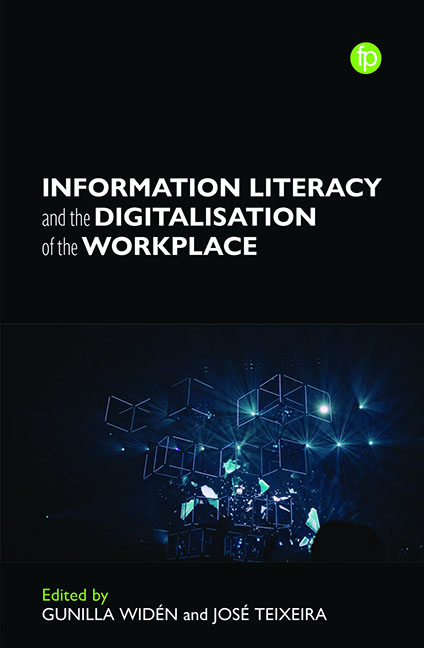Book contents
- Frontmatter
- Contents
- Figures and Tables
- Contributors
- Introduction: Advancing Theory on Workplace Information Literacy
- 1 Literature Review: In Search of the Many Meanings of Information Literacy
- 2 Digital Literacy in a Post-Digital Era: Rethinking ‘Literacy’ as Sociomaterial Practice
- 3 Methodological Choices of Information Literacy in the Workplace: Qualitative, Quantitative or Mixed-Methods?
- 4 Investigating Information Seeking and Information Sharing Using Digital Trace Data
- 5 Making Do With Limited Transparency of Sensitive Information in Secretive Organisations: Collective Information Literacy Through Hinting
- 6 Information Literacy Competencies for Career Transitions in the Digital Age
- 7 The Importance of Information Literacy for Work Satisfaction in a World-Wide-Workplace Context
- 8 Entrepreneurs’ Digital Information Sources Selection: A Perspective on the Impact of Information Literacy and Generational Differences
- 9 Conclusion: Workplace Information Literacy as the Literacy of the Digital Workplace
- Index
9 - Conclusion: Workplace Information Literacy as the Literacy of the Digital Workplace
Published online by Cambridge University Press: 17 December 2023
- Frontmatter
- Contents
- Figures and Tables
- Contributors
- Introduction: Advancing Theory on Workplace Information Literacy
- 1 Literature Review: In Search of the Many Meanings of Information Literacy
- 2 Digital Literacy in a Post-Digital Era: Rethinking ‘Literacy’ as Sociomaterial Practice
- 3 Methodological Choices of Information Literacy in the Workplace: Qualitative, Quantitative or Mixed-Methods?
- 4 Investigating Information Seeking and Information Sharing Using Digital Trace Data
- 5 Making Do With Limited Transparency of Sensitive Information in Secretive Organisations: Collective Information Literacy Through Hinting
- 6 Information Literacy Competencies for Career Transitions in the Digital Age
- 7 The Importance of Information Literacy for Work Satisfaction in a World-Wide-Workplace Context
- 8 Entrepreneurs’ Digital Information Sources Selection: A Perspective on the Impact of Information Literacy and Generational Differences
- 9 Conclusion: Workplace Information Literacy as the Literacy of the Digital Workplace
- Index
Summary
The starting point of this book has been a growing realisation of the impact of digitalisation and digital information on the transformation of the contemporary workplace. Today's workplace is very different from how a place of work has been conceptualised previously. Information and informational skills, competencies and capabilities have a similarly radically different role in how people work and how work and workplaces are organised. All this makes workplace information literacy a crucial condition for their successful digitalisation.
Underlining the impact of digital information and informational competencies might sound like stating the obvious, especially when the massive impact on information literacies established itself as a cliché more than a decade ago (Francke, Sundin and Limberg, 2011). However, it has become all the more apparent that information literacies are a fleeting target that evolve alongside digitalisation and its contexts. Among literacies, workplace information literacy (WIL) and workplace as a site of literacies has so far received comparatively less attention than other information literacies in education and library contexts. This is an issue that this book aimed to address by introducing and discussing perspectives and approaches to how information literacy can function as a key concept in not only understanding but also making a difference in the workplaces of today and tomorrow.
In the preceding chapters, we have made excursions to different aspects of WIL and its role in the contemporary and future workplace. Some of these explorations have pointed to theoretical and conceptual issues, methodological considerations on how to investigate WIL, processual and transitional perspectives on what it takes to be information literate in different contexts, and what the outcomes and implications are in the workplace.
From a conceptual and theoretical perspective, the extensive literature review conducted by Teixeira and Karim (Chapter 1) points to the diversity of perspectives on the information literacy concept. The diversity can be seen both as an opportunity and a complication. It is a strength as long as it helps to address different aspects of being (information) literate in increasingly digitalising (information) work. However, it can become a burden if WIL research and practice loses sight of the essence of the concept: skills, competencies and mastery of the complex informational landscape of the contemporary workplaces. A prominent risk is also if the various WILs are too violently torn apart from each other by overemphasising their differences.
- Type
- Chapter
- Information
- Information Literacy and the Digitalisation of the Workplace , pp. 145 - 152Publisher: FacetPrint publication year: 2023



